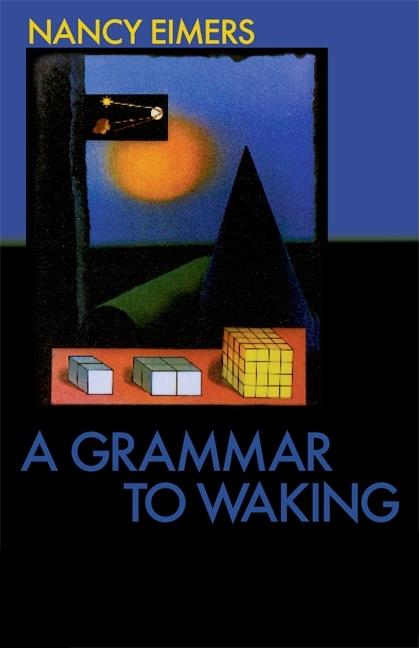Nancy Eimers is the author of four poetry collections: Oz (2011), A Grammar to Waking (2006), No Moon (1997), and Destroying Angel (1991). Eimers has been the recipient of a Nation “Discovery” Award, two NEA Fellowships, and a Pushcart Prize. Her poems have appeared in numerous magazines, including Field, Paris Review, The Nation, Antioch Review, North American Review, TriQuarterly, and Poetry Northwest, and in many anthologies, including Best American Poetry, Poets of the New Century, The Wesleyan Tradition, The Extraordinary Tide: New Poetry by American Women, and The New Bread Loaf Anthology of Contemporary American Poetry. Eimers teaches creative writing at Western Michigan University in Kalamazoo, Michigan.

-
No MoonPoemsFrom"World of Tomorrow"
To be inside a body that’s going to go
is not so bad. A train rushes out of a station
and by the time it’s gone around the bend
that town is a tiny abandoned World of Tomorrow.
Passengers looking out of the train
see the windows of warehouses are the slow in a penny arcade
and they tell time by the clock face of every house.
Steel springs coil inside the trees.
Then the train will pull them down the tracks
they can’t invent fast enough for their need to survive.
 No Moon: Poems
No Moon: Poems -
No MoonPoemsFrom"The Pelican Girl"
His voice is dreamy, saying her name.
Sometimes don’t we talk that way
about the old loves, the lost ones?
Said as if parting had charmed her life:
that Pelican girl,
named like the one if a fairy tale bewitched at dawn,
awakening to a fish-light polish
along her spooning bill and newly hopeful
boat-shaped buoyancy. Later the townsfolk,
whose eyes are idle glimmerings,
will search the waves for her human body
as pelicans plunge and scoop
and her happiness opens out like wingspread
soundlessly over the rooftops
as if it were trying not to wake them.
 No Moon: Poems
No Moon: Poems -
No MoonPoemsFrom"Outer Space"
The street didn't know there was anything wrong
with its shingles, flashings, sockets, anthills,
deferrals, lulls.
I heard the sound slide out of its words.
Not a full-moon question asked of the windows that gorge
on the magnitudes of the stars
but a lifting up of a human voice
that could not lie and could not promise to lift us
out of disrepair
or lift us in our waiting out of what we are waiting for.
 No Moon: Poems
No Moon: Poems
“In Eimers' Oz, the squared-off rooms of prose press against the open-roofed, wall-less abodes of poems. Dollhouses, bomb shelters, Cornell's boxes—Eimers is fascinated by those fascinated with such ‘contraption[s] of inner space.’ Space managed and manageable. But around such contraptions, one feels the larger uncontainable world lurking, leering. From encapsulated space, a self sees out and gathers strength to step out. This dance between estrangement and communion—it's part of how we survive; it's the jittery way, these poems beautifully suggest, we move toward compassion.” —Nance Van Winckel
“There is as true a feeling of consolation delivered by this book as any I have read in recent years. Nancy Eimers makes a mirror out of our tears, and then turns that mirror at an angle so that we can see what lies hidden from our sight. Her poems answer Basho's great question, one of the essential questions of all lyric poetry: ‘my neighbor—how does he live, I wonder?’ This is that rare book whose compassion is as deep as its craft.” —David Rivard [on Oz]
"These poems unfold with such compassionate intelligence and in language so supple and strong as silk that one follows them with complete trust. Eimers has a remarkable ability for giving even the slightest things of our experience the reverence of attention—from a flock of birds, 'little candles dipping down out of one tree / and dripping / up into another . . .' to the heat 'like the final exhalation of a Wal-Mart store.' She understands the 'towardness of the world' and the result is a new and rapturous intimacy with what we thought was merely familiar. This is what the best poetry does, awaken us, and, in Heidegger's words, brings us onto the earth. A Grammar to Waking is that rare and powerful a book." —Beckian Fritz Goldberg
Selected Works

- Print Books
- Barnes & Noble
- New Michigan Press


